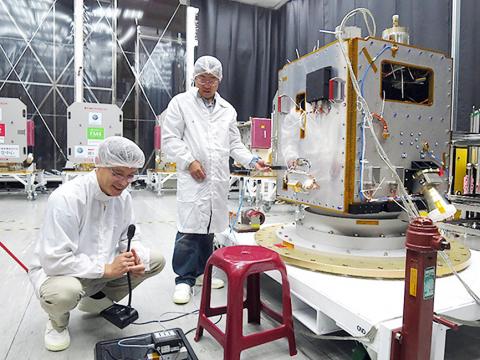The nation’s second domestically developed satellite, Triton (獵風者), is slated to be launched in the second half of 2021 by French firm Arianespace at a base in French Guiana, the National Space Organization (NSPO) said on Friday.
Dubbed the “Wind Hunter,” the satellite will be tasked with gathering data about sea wind and working with the Formosat-7 constellation to advance the nation’s weather forecasting capacity, NSPO Deputy Director-General Yu Shiann-jen (余憲政) said.
The six-satellite Formosat-7 constellation — a Taiwan-US collaborative program — was launched by the US company SpaceX with other foreign satellites from the Kennedy Space Center in Florida on June 25.

Photo provided by the National Space Organization
The nation’s first domestically developed satellite Formosat-5, a remote-sensing satellite, was also launched by SpaceX on Aug. 25, 2017 from the Vandenberg Air Space in California.
For the Triton launch, two companies — Arianespace and another foreign firm — competed for the bid, Yu said.
Most of Triton’s critical components and payload instruments were developed by Taiwanese personnel, with its ratio of indigenous development reaching 87 percent, 9 points higher than for Formosat-5, he said.
Its payload instrument — the Global Navigation Satellite System Reflectometry (GNSS-R) — as well as other critical components, such as the onboard computer, the power control unit, the GPS receiver and a fiber-optic gyro, were developed by NSPO personnel, Yu said.
The cubic satellite, measuring about 280kg, is equipped with a deployable solar panel on one side, according to Triton’s project description on the NSPO’s Web site.
It will be launched with other satellites from an orbit of 500km to 600km from the ground, with an inclination angle of no smaller than 24°, while the actual parameters should be confirmed along with other satellites, the NSPO said.
Some of the techniques used in developing Triton were an improvement on those used in Formosat-5, and they would be further advanced when developing the nation’s next satellite program, Formosat-8, a remote-sensing satellite, Yu said.
Additional reporting by CNA

DEFENSE: The National Security Bureau promised to expand communication and intelligence cooperation with global partners and enhance its strategic analytical skills China has not only increased military exercises and “gray zone” tactics against Taiwan this year, but also continues to recruit military personnel for espionage, the National Security Bureau (NSB) said yesterday in a report to the Legislative Yuan. The bureau submitted the report ahead of NSB Director-General Tsai Ming-yen’s (蔡明彥) appearance before the Foreign and National Defense Committee today. Last year, the Chinese People’s Liberation Army (PLA) conducted “Joint Sword-2024A and B” military exercises targeting Taiwan and carried out 40 combat readiness patrols, the bureau said. In addition, Chinese military aircraft entered Taiwan’s airspace 3,070 times last year, up about

Taiwan is stepping up plans to create self-sufficient supply chains for combat drones and increase foreign orders from the US to counter China’s numerical superiority, a defense official said on Saturday. Commenting on condition of anonymity, the official said the nation’s armed forces are in agreement with US Admiral Samuel Paparo’s assessment that Taiwan’s military must be prepared to turn the nation’s waters into a “hellscape” for the Chinese People’s Liberation Army (PLA). Paparo, the commander of the US Indo-Pacific Command, reiterated the concept during a Congressional hearing in Washington on Wednesday. He first coined the term in a security conference last

A magnitude 4.3 earthquake struck eastern Taiwan's Hualien County at 8:31am today, according to the Central Weather Administration (CWA). The epicenter of the temblor was located in Hualien County, about 70.3 kilometers south southwest of Hualien County Hall, at a depth of 23.2km, according to the administration. There were no immediate reports of damage resulting from the quake. The earthquake's intensity, which gauges the actual effect of a temblor, was highest in Taitung County, where it measured 3 on Taiwan's 7-tier intensity scale. The quake also measured an intensity of 2 in Hualien and Nantou counties, the CWA said.

The Overseas Community Affairs Council (OCAC) yesterday announced a fundraising campaign to support survivors of the magnitude 7.7 earthquake that struck Myanmar on March 28, with two prayer events scheduled in Taipei and Taichung later this week. “While initial rescue operations have concluded [in Myanmar], many survivors are now facing increasingly difficult living conditions,” OCAC Minister Hsu Chia-ching (徐佳青) told a news conference in Taipei. The fundraising campaign, which runs through May 31, is focused on supporting the reconstruction of damaged overseas compatriot schools, assisting students from Myanmar in Taiwan, and providing essential items, such as drinking water, food and medical supplies,